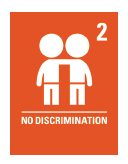This week our ‘Right of the Week’ is Article 17
Children have the right to get information from the Internet, radio, television, newspapers, books and other sources.
Adults should make sure the information they are getting is not harmful.
This week’s ‘Right’ is linked to International Women’s Day on the 23rd of February.
Article 2 – No discrimination
All children have all these rights, no matter who they are, where they live, what language they speak, what their religion is, what they think, what they look like, if they are a boy or girl, if they have a disability, if they are rich or poor, and no matter who their parents or families are or what their parents or families believe or do. No child should be treated unfairly for any reason.

Our rights this week linked to World Book Day.
We were reading to get information (Article 17 – access to information from the media), to learn and develop (Article 29 – goals of education) or for pleasure (Article 31 – leisure, play and culture).
This week our ‘Right of the Week’ is Article 3 .
Article 3 – Best Interests of the Child
When adults make decisions, they should think about how their decisions will affect children. All adults should do what is best for children. Governments should make sure children are protected and looked after by their parents, or by other people when this is needed. Governments should make sure that people and places responsible for looking after children are doing a good job.
On 8 February we celebrate Safer Internet Day – an annual global event promoting safe and positive use of digital technology for children and young people.This year, Safer Internet Day will focus on exploring respect and relationships online. This is a great opportunity to discuss with our learners how they navigate the online world, while making a link to rights. Our activities explore the broad themes of Safer Internet Day with some of them linking to the right to relax and play (Article 31), protection from harm (Article 19) and to the importance of respect and dignity.
Article 19 – Protection from violence
Governments must protect children from violence, abuse and being neglected by anyone who looks after them.
Article 31 – Rest, play, culture, arts
Every child has the right to rest, relax, play and to take part in cultural and creative activities.
It is Scotland Loves Languages Week. Article 30 of the UNCRC states that we have the right to celebrate and learn about languages and customs.
We are also thinking about identity and how we can support others to feel safe and comfortable to be their true selves, whether that’s in our school, community or beyond.
Article 30 – Minority culture, language and religion
Children have the right to use their own language, culture and religion – even if these are not shared by most people in the country where they live.
Article 2 – No discrimination
All children have all these rights, no matter who they are, where they live, what language they speak, what their religion is, what they think, what they look like, if they are a boy or girl, if they have a disability, if they are rich or poor, and no matter who their parents or families are or what their parents or families believe or do. No child should be treated unfairly for any reason.
Article 13 – Sharing thoughts freely
Children have the right to share freely with others what they learn, think and feel, by talking, drawing, writing or in
any other way unless it harms other people.
Article 17 – Access to information
Children have the right to get information from the Internet, radio, television, newspapers, books and other sources. Adults should make sure the information they are getting is not harmful. Governments should encourage the media to share information from lots of different sources, in languages that all children can understand.
Next week, on 27 January, we observe Holocaust Memorial Day and remember those who lost their lives in the Holocaust and other genocides around the world.
Article 2 – No discrimination
All children have all these rights, no matter who they are, where they live, what language they speak, what their religion is, what they think, what they look like, if they are a boy or girl, if they have a disability, if they are rich or poor, and no matter who their parents or families are or what their parents or families believe or do. No child should be treated unfairly for any reason.
Article 19 – Protection from violence
Governments must protect children from violence, abuse and being neglected by anyone who looks after them.
Article 37 – Children in detention
Children who are accused of breaking the law should not be killed, tortured, treated cruelly, put in prison forever, or put in prison with adults. Prison should always be the last choice and only for the shortest possible time. Children in prison should have legal help and be able to stay in contact with their family.
Article 38 – Protection in war
Children have the right to be protected during war. No child under 15 can join the army or take part in war.
Glow Blogs uses cookies to enhance your experience on our service. By using this service or closing this message you consent to our use of those cookies. Please read our Cookie Policy.